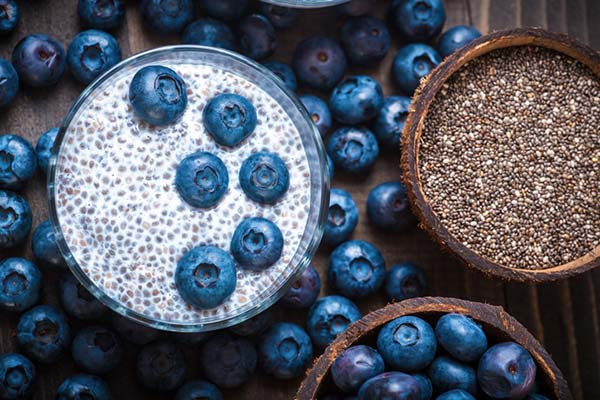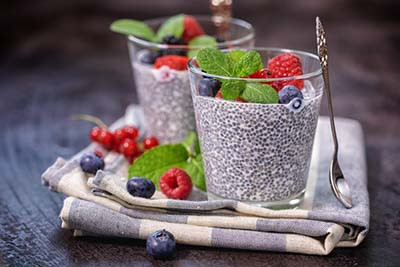
Maximize Your Health: Exploring the Benefits of Chia Seeds | Harvard Health

Chia seeds are nutritional powerhouses offering a wide range of health benefits. Learn how these tiny seeds can positively impact your well-being, from improving heart health to supporting weight management. This article, reviewed by Harvard Health experts, explores the science-backed advantages of incorporating chia seeds into your daily diet.
What Makes Chia Seeds a Superfood? Discover Their Origins
Chia seeds come from the Salvia hispanica plant, native to Central America, and have been consumed for over 5,000 years. They were a staple food for ancient civilizations like the Aztecs and Mayans.
These small black or white seeds are packed with:
- Fiber
- Protein
- Omega-3 fatty acids
- Antioxidants
- Essential vitamins and minerals
Unlock a Healthier You: Proven Benefits of Chia Seeds
Incorporating chia seeds into your diet can lead to significant health advantages. Research suggests chia seeds may help with:
- Improving Heart Health: Reduce blood pressure and lower cholesterol.
- Aiding Digestion: High fiber content promotes healthy bowel movements.
- Managing Weight: Increase fullness and reduce calorie intake.
- Fighting Inflammation: Antioxidants combat harmful free radicals.
- Controlling Diabetes: Help stabilize blood sugar levels.
- Boosting Mental Well-being: Improve anxiety and depression symptoms.
When ingested, chia seeds form a gel-like substance in the stomach, helping to curb appetite and support weight management.

The Nutritional Arsenal: What's Inside Chia Seeds?
Chia seeds contain a wealth of nutrients that cater to various aspects of your health. Here's a breakdown of their key nutritional components:
Omega-3 Fatty Acids: Fuel Your Brain and Heart
Chia seeds are an excellent source of alpha-linolenic acid (ALA), a type of omega-3 fatty acid. Since the human body cannot produce ALA on its own, obtaining it through diet is vital. ALA is associated with a reduced risk of heart disease and supports brain function and reduces inflammation.
Consider this: while fatty fish is often touted as the best source of Omega-3s, chia seeds offer a plant-based alternative, crucial for vegetarians and those avoiding seafood.
Fiber: Your Digestive System's Best Friend

Just one ounce of chia seeds provides roughly 9.8 grams of dietary fiber. Adequate fiber intake is linked to a decreased risk of:
- Coronary heart disease
- Type 2 diabetes
- Certain cancers
- Inflammation
- Digestive disorders
Fiber aids heart health by lowering LDL ("bad") cholesterol and increasing HDL ("good") cholesterol. The high fiber content promotes healthy digestion by softening stool and facilitating easier passage through the intestines, alleviating constipation.
Antioxidants: Shielding Your Cells
Chia seeds boast a rich profile of antioxidants, including tocopherols, phytosterols, carotenoids, and polyphenolic compounds. Incorporating antioxidant-rich foods like chia seeds can protect the body from damage caused by free radicals.
Antioxidants play a key role in preventing:
- Inflammation
- Diabetes
- Cancer
- Heart disease
- Alzheimer's disease
Protein: Stabilize Energy Levels

Chia seeds offer a valuable source of plant-based protein, containing all nine essential amino acids. Protein helps stabilize blood sugar levels, providing a steady and sustained energy source throughout the day.
Delicious and Easy: Creative Ways to Add Chia Seeds to Your Meals
Chia seeds have a mild flavor, making them easy to add to various dishes without altering the taste. Consider these simple ideas for incorporating chia seeds into your diet:
- Sprinkle on yogurt, cereal, or salads
- Add to smoothies or soups
- Mix into pancake batter
- Create a nutritious breakfast bowl

Simple Chia Pudding Recipe for a Healthy Treat

Chia pudding is a versatile and nutritious option. Here’s a basic recipe:
- Combine 2 tablespoons of chia seeds with 1/2 cup of milk (almond, soy, or dairy).
- Mix well, ensuring no clumps form.
- Refrigerate for at least 15 minutes (preferably 4 hours or overnight) to thicken.
- Add your favorite toppings like berries, nuts, cinnamon, or a touch of sweetener.
Harvard Health Resources: Further Reading
For more information on healthy eating and the benefits of various nutrients, explore these resources from Harvard Health:
Important Disclaimer
The content provided in this article is for informational purposes only and should not be considered medical advice. Always consult with a qualified healthcare professional for personalized guidance and treatment.















